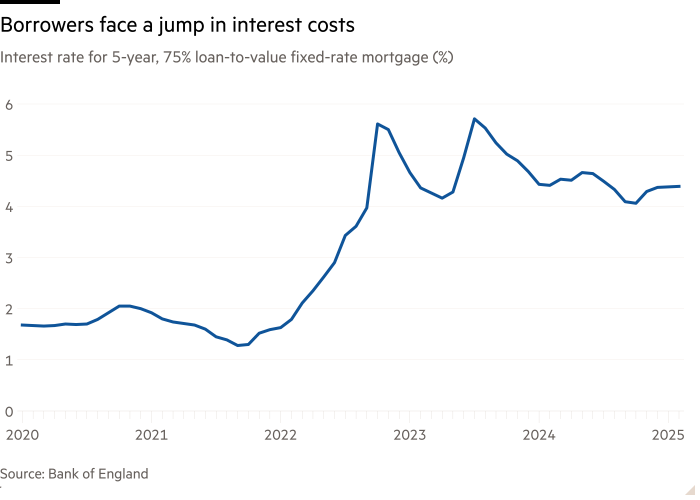Unlock the Editor’s Digest for free
Roula Khalaf, Editor of the FT, selects her favourite stories in this weekly newsletter.
It’s going to be a busy year for Britain’s mortgage industry. More than a million households are in for a serious payment shock as they refinance loans taken out at rock-bottom rates during the coronavirus pandemic. Banks should be able to absorb the impact without too much damage; the rest of the economy might take it harder.
As much as £320bn worth of residential and buy-to-let loans are likely to need refinancing in 2025, according to the Mortgage Advice Bureau, one of the UK’s largest mortgage brokers. The biggest driver will be homeowners who borrowed during the mid-pandemic housing market boom and are now approaching the end of five-year fixed terms.
Five years ago, the average interest rate on a five-year fixed mortgage with a 75 per cent loan-to-value ratio was just shy of 1.7 per cent, according to the Bank of England. By the end of this February, it was 4.39 per cent.

In its last financial stability report, the central bank estimated that, for the typical borrower rolling off a fixed rate in the next two years, monthly repayments will increase by £146. That includes a minority for whom repayments will fall — such as those who took out shorter-term fixes when mortgage rates increased in the aftermath of Liz Truss’s mini-budget in 2022.
Most borrowers should have enough money to pay for the higher rates. That minimises the risks from a financial stability standpoint: the BoE said last November that it expected households to “remain resilient in aggregate”, an opinion that has been echoed more recently by individual banks.
The bad news is that if people are spending more on their mortgages, they will be spending less elsewhere.
UKFinance, a trade body, estimates that there are about 3.7mn fixed-term mortgages due to expire in 2025 and 2026. Multiplying those by the BoE’s estimate of a £146 increase per affected household yields £540mn in extra monthly interest payments coming through over the next two years. That’s the equivalent of more than 1 per cent of total monthly retail spending, or the monthly revenues of high street bellwether Next.
The impact on spending will not be one-to-one — a BoE survey in 2023 found that a £100 increase in mortgage payments leads to a £50 fall in other spending. Rising wages may also help cushion the hit.
But it comes at a time when consumers are already having to tighten their belts. Rising household bills and jumping business costs have led to talk of an “awful April”. Any more shocks — such as a big hit from a trade war — could see awful April turn into a whole summer of sadness.










